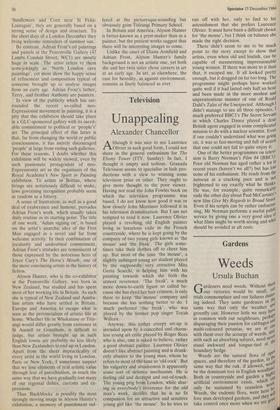Television
Unappealing
Alexander Chancellor
Although it was nice to see Laurence Olivier in such good form, I could not share in the general enthusiasm for The Ebony Tower (ITV, Sunday). In fact, I thought it empty and tedious. Granada Television seems to specialise in lush pro- ductions with a view to winning some television prize or other. They ought to give more thought to the poor viewer. Having not read the John Fowles book on which the television programme was based, I do not know how good it was or how closely John Mortimer followed it in his television dramatisation. But I am not tempted to read it now. Laurence Olivier played a revolting old English painter living in luxurious exile in the French countryside, where he is kept going by the company of two young girls known as 'the mouse' and 'the freak'. The girls some- times take their clothes off to cheer him up. But most of the time 'the mouse', a slightly unhinged young art student played by the supposedly very attractive Miss Greta Scacchi, is helping him with his painting towards which she feels the utmost reverence. The freak', a much more down-to-earth figure so called be- cause she has dyed her hair crimson, is only there to keep 'the mouse' company and because she has nothing better to do. I much preferred 'the freak', who was played by the former pop singer Toyah Willcox.
Anyway, this rather creepy set-up is intruded upon by a conceited and charm- less young art critic played by Roger Rees who is also, one is asked to believe, rather a good abstract painter. Laurence Olivier doesn't like abstract painting and is drunk- enly abusive to the young man, whom he refers to most of the time as 'old cock'. But his vulgarity and abusiveness is apparently some sort of defence mechanism. He is feeling old and decrepit and out-of-touch. The young prig from London, while shar- ing in everybody's reverence for the old man's work, decides that he is no fit companion for an attractive and sensitive young girl like 'the mouse'. So he tries to run off with her, only to find to his astonishment that she prefers Laurence Olivier. It must have been a difficult choice for 'the mouse', but I think on balance she made the right decision. There didn't seem to me to be much point to the story except to show that artists, even when old and loutish, can be capable of mesmerising impressionable young women. If there was more to it than that, it escaped me. It all looked prettY enough, but it dragged on far too long. The programme might perhaps have worked quite well if it had lasted only half an hour and been made in the more modest and unprententious manner of one of Roald Dahl's Tales of the Unexpected. Although I didn't manage to see all three episodes, I much preferred BBC1's The Secret Servant in which Charles Dance played a dour British agent engaged in some complicated mission to do with a nuclear scientist. Even if one couldn't understand what was going on, it was so fast-moving and full of action that one could not fail to quite enjoy it.
One of the better programmes on telew sion is Barry Norman's Film 84 (BBCI). Poor old Norman has aged rather a lot Is recent years (haven't we all?) but has lost none of his enthusiasm. He reads from the autocue at a cracking pace and is frightened to say exactly what he thinks. He was, for example, quite remarkabl,Y rude the other day about Paul McCartneY 5 new film Give My Regards to Broad Street. Even if his scripts can be rather embarrar sing, Mr Norman performs a useful public, service by giving one a very good idea O: what films might be worth seeing and WM' should be avoided at all costs.


















































 Previous page
Previous page